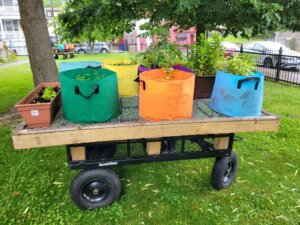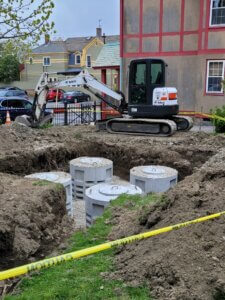
Practicing God
 I hope that you’ve seen the progress this last week in the Community Garden! With our rainbow grow bags on the garden carts, newly planted potato bags on the swing set, and tomatoes, peppers, eggplant, herbs, and lettuces coming up, we’re well into our green season of growth at Emmanuel, both in the garden and in our community. Green is the traditional liturgical color for Ordinary Time — those weeks between Pentecost and All Saints’ Day. And it’s the perfect color to express the growth in our lives and ministries, while it’s green growth time in our Community Garden.
I hope that you’ve seen the progress this last week in the Community Garden! With our rainbow grow bags on the garden carts, newly planted potato bags on the swing set, and tomatoes, peppers, eggplant, herbs, and lettuces coming up, we’re well into our green season of growth at Emmanuel, both in the garden and in our community. Green is the traditional liturgical color for Ordinary Time — those weeks between Pentecost and All Saints’ Day. And it’s the perfect color to express the growth in our lives and ministries, while it’s green growth time in our Community Garden.
Speaking of the Community Garden, did anyone see science and health reporter Dana Smith’s article in the New York Times this week, “Why Gardening Is So Good for You?” Digging holes can be a workout and mood booster all rolled into one, the article’s cut line read. Gardening gives people a sense of meaning and purpose, and an opportunity to nurture in a context that gives us feedback in real time. It’s simple and obvious: water, sun, and care yield beautiful tomatoes right before your eyes. Smith says, Gardening gets you moving, forms connections, and gives a sense of well-being. And working with plants helps people to see where they fit in the world, and how we both affect, and depend on, our relationship with our natural environment for our own lives. The cause and effect relationship of our care on plants is so visible and immediate that we can see how we fit, and matter, in the world. In addition, especially in a community garden, gardening can help grow connection and belonging, both in the community and in and to the wider world.
Practicing Right Relationship
Gardening, like many of the things we do at Emmanuel, is a way of practicing right relationship. Practicing right relationship is different from practicing piano, organ, or singing like Randy, Suzanna, Ali, or anyone in the Musicians’ Circle do as they get ready for a Sunday service or a performance. Practicing right relationship is more like practicing law or practicing medicine — that is the doing of the thing itself, all the time, every day, as a habit. For all of us, practicing right relationship is a matter of ultimate and immediate consequence.
 Practicing right relationship is not just about heading off the epidemic of loneliness and isolation that Surgeon General Dr. Vivek Murthy calls our greatest public health crisis. Loneliness and isolation lead directly to the social and political ill health of racism, sexism, and suspicion of difference of any kind, news echo chambers, identity politics, and radicalism — that is, the basis for most conflict both at home and abroad.
Practicing right relationship is not just about heading off the epidemic of loneliness and isolation that Surgeon General Dr. Vivek Murthy calls our greatest public health crisis. Loneliness and isolation lead directly to the social and political ill health of racism, sexism, and suspicion of difference of any kind, news echo chambers, identity politics, and radicalism — that is, the basis for most conflict both at home and abroad.
Practicing right relationship is not only the antidote for loneliness and isolation’s devastating effect on our physical health, leading directly to depression, addiction, and other even more violent and horrible forms of self harm. Practicing right relationship is more than all that: it’s about our very survival as human beings. It’s really that big a deal.
How does that work? We must be able to communicate effectively with each other — through difference — in order to understand each other’s context, perspective, and lived reality so that we can connect, belong, and heal our social, political, and emotional health ills. We must be able to be present and listen to each other’s context, perspective, and ideas with curiosity, so that we can reimagine a world that includes all of our lived realities. We are interdependent with each other and our environment, and our very survival — emotional, spiritual, social, economic, educational, and physical — depends on it.
Communicate Effectively Through Difference
 So how do we do that? Just for an example, take our Big Dig out in the churchyard. We all have personal experience here on Aquidneck Island with the real effects of climate change. How do we sort through the science, the data, the necessary economic drivers, and the socio-economic effects and consequences to all of us to thrive together? I think we practice, right here at Emmanuel. We practice by engaging — digging in deep to our community, prizing civic literacy, participating in local government, and building relationship with our neighbors down the block, across the street, across the bridge, from other time zones, and in the remotest, most different places we can imagine in the Anglican Communion. We practice right relationship every chance we get. I’ve said it here before, and I’ll say it again: Church. Saves. Lives. Synagogue saves lives. Mosque saves lives. How is that, you ask? Because making it our consistent practice in life always to seek right relationship is to practice God — that is, to engage in God’s practices.
So how do we do that? Just for an example, take our Big Dig out in the churchyard. We all have personal experience here on Aquidneck Island with the real effects of climate change. How do we sort through the science, the data, the necessary economic drivers, and the socio-economic effects and consequences to all of us to thrive together? I think we practice, right here at Emmanuel. We practice by engaging — digging in deep to our community, prizing civic literacy, participating in local government, and building relationship with our neighbors down the block, across the street, across the bridge, from other time zones, and in the remotest, most different places we can imagine in the Anglican Communion. We practice right relationship every chance we get. I’ve said it here before, and I’ll say it again: Church. Saves. Lives. Synagogue saves lives. Mosque saves lives. How is that, you ask? Because making it our consistent practice in life always to seek right relationship is to practice God — that is, to engage in God’s practices.
Today we read about Samuel, who served as a priest and then became the first prophet and last judge in Israel. I love that Steve Huttler read the first verses to us in Hebrew, to remind us both of Judaism’s, Christianity’s, and Islam’s common heritage in that text and how very long God has been trying to teach us about right relationship. Samuel is part of God’s long project of teaching right leadership, and Samuel has done a good job during his time. But he’s old, the people say, and his sons have a history of accepting bribes to change their judicial decisions, cheating people in court, so they are not worthy successors. The people tell Samuel they want a king, just like all the other nations have, they say. God tells Samuel that it’s God’s leadership, not Samuel’s, that the people have rejected, and to go ahead and anoint a king, but warn them first that an earthly king will take their sons and daughters, the very best of their lands, their crops, workers, livestock, and produce, and put it all to work for the king’s agenda and not theirs, Samuel says.
[He] will appoint for himself commanders … and some to plow his ground and to reap his harvest, and to make implements of war and chariots. He will take your daughters to be perfumers and cooks and bakers. He will take the best of your fields and vineyards and olive orchards and give them to his courtiers. He will take one-tenth of your grain and of your vineyards and give it to his officers and his courtiers.
Right Leadership Means Right Relationship
Now, it’s easy to get distracted by all the awful outcomes of choosing earthly agendas over God’s and jump to the conclusion that this passage is a critique of monarchy or of earthly government generally. But we’re missing something big here if we reduce our understanding of this passage to such a small idea — don’t lose the thread here: this passage is about right leadership, which means right relationship, which has its foundations in community and in the practice of God. Mark’s gospel today makes the same point:
If a kingdom is divided against itself,
that kingdom cannot stand.
And if a house is divided against itself,
that house will not be able to stand.
 So how do we practice right relationship at Emmanuel so that we can even begin to understand and effect right leadership and be agents of change in the world and in our own lives? Practicing right relationship means growing together, staying curious, listening to each other, and always being ready to learn something new or have our minds changed. Practicing right relationship means working together to make a beautiful new altar for the crossing from the wood of the pews we removed for dancing and worshiping together in this beautiful space. Practicing right relationship means recruiting volunteers for lawn care, planning music, food, and fun on the lawn for the Pride Day parade, and creating programs and relationships that engage us with the larger community and the world. Practicing right relationship means working with Newport Classical to make the Community Bridge a reality, engaging people from different contexts, traditions, perspectives, and backgrounds on common ground, to work together on how we fit together, work together, live together, and thrive together. And maybe, just maybe, gardening is the way to start, as we grow together in this green, Ordinary Time season like companion plants. Amen
So how do we practice right relationship at Emmanuel so that we can even begin to understand and effect right leadership and be agents of change in the world and in our own lives? Practicing right relationship means growing together, staying curious, listening to each other, and always being ready to learn something new or have our minds changed. Practicing right relationship means working together to make a beautiful new altar for the crossing from the wood of the pews we removed for dancing and worshiping together in this beautiful space. Practicing right relationship means recruiting volunteers for lawn care, planning music, food, and fun on the lawn for the Pride Day parade, and creating programs and relationships that engage us with the larger community and the world. Practicing right relationship means working with Newport Classical to make the Community Bridge a reality, engaging people from different contexts, traditions, perspectives, and backgrounds on common ground, to work together on how we fit together, work together, live together, and thrive together. And maybe, just maybe, gardening is the way to start, as we grow together in this green, Ordinary Time season like companion plants. Amen
